Top Rankings
Arab City School District ranks among the top 20% of public school district in Alabama for:
Category
Attribute
Overall Rank
Highest overall rank (Top 10%)
Math Proficiency
Highest math proficiency (Top 10%)
Reading/Language Arts Proficiency
Highest reading/language arts proficiency (Top 10%)
Science Proficiency
Highest science proficiency (Top 10%)
Graduation Rate
Highest graduation rate (Top 5%)
For the 2025 school year, there is 1 public preschool serving 703 students in Arab City School District.
Public Preschools in Arab City School District have a diversity score of 0.14, which is less than the Alabama public preschool average of 0.63.
Minority enrollment is 8% of the student body (majority Hispanic), which is less than the Alabama public preschool average of 48% (majority Black).
Overview
This School District
This State (AL)
# Schools
4 Schools
648 Schools
# Students
2,637 Students
310,670 Students
# Teachers
157 Teachers
18,546 Teachers
Student : Teacher Ratio
17:1
17:1
District Rank
Arab City School District, which is ranked within the top 10% of all 145 school districts in Alabama (based off of combined math and reading proficiency testing data) for the 2021-2022 school year.
The school district's graduation rate of 95% has stayed relatively flat over five school years.
Overall District Rank
#10 out of 145 school districts
(Top 10%)
(Top 10%)
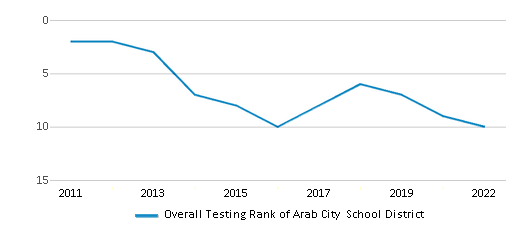
Math Test Scores (% Proficient)
55%
29%
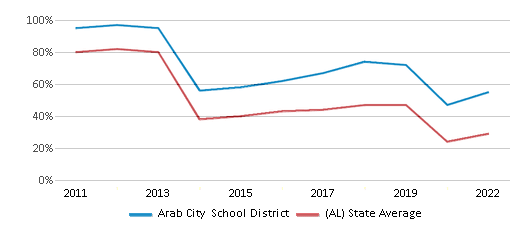
Reading/Language Arts Test Scores (% Proficient)
64%
47%
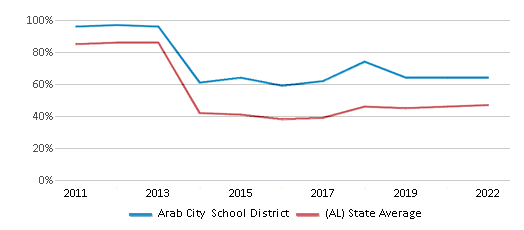
Science Test Scores (% Proficient)
54%
38%
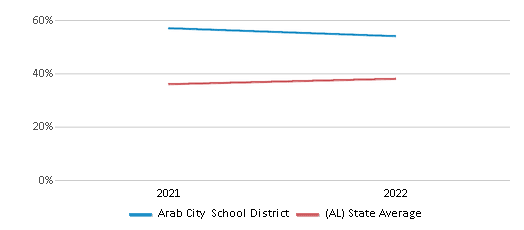
Graduation Rate
≥95%
88%
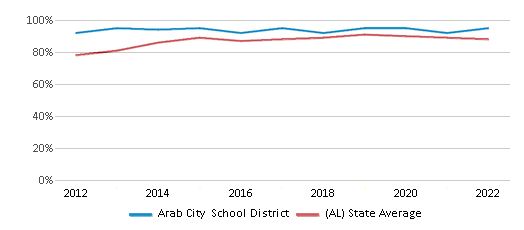
Students by Ethnicity:
Diversity Score
0.15
0.63
# American Indian Students
12 Students
3,275 Students
% American Indian Students
1%
1%
# Asian Students
35 Students
3,474 Students
% Asian Students
1%
1%
# Hispanic Students
100 Students
33,026 Students
% Hispanic Students
4%
11%
# Black Students
20 Students
93,822 Students
% Black Students
1%
30%
# White Students
2,435 Students
162,634 Students
% White Students
92%
52%
# Hawaiian Students
2 Students
315 Students
% Hawaiian Students
n/a
n/a
# Two or more races Students
33 Students
14,124 Students
% of Two or more races Students
1%
5%
Students by Grade:
# Students in PK Grade:
104
21,304
# Students in K Grade:
207
49,720
# Students in 1st Grade:
199
50,373
# Students in 2nd Grade:
193
48,594
# Students in 3rd Grade:
202
40,410
# Students in 4th Grade:
208
36,751
# Students in 5th Grade:
185
31,378
# Students in 6th Grade:
201
12,553
# Students in 7th Grade:
196
4,421
# Students in 8th Grade:
195
4,401
# Students in 9th Grade:
212
2,950
# Students in 10th Grade:
193
2,768
# Students in 11th Grade:
178
2,555
# Students in 12th Grade:
164
2,492
# Ungraded Students:
-
-
District Revenue and Spending
The revenue/student of $11,659 in this school district is less than the state median of $13,006. The school district revenue/student has stayed relatively flat over four school years.
The school district's spending/student of $10,536 is less than the state median of $12,220. The school district spending/student has stayed relatively flat over four school years.
Total Revenue
$31 MM
$9,671 MM
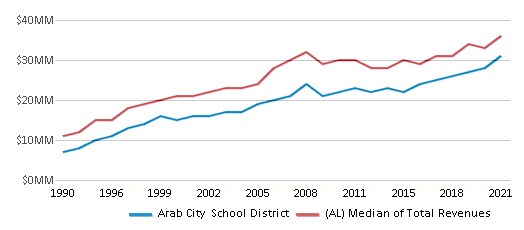
Spending
$28 MM
$9,086 MM
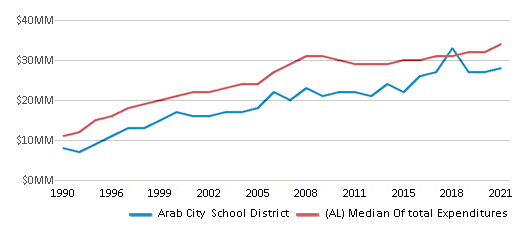
Revenue / Student
$11,659
$13,006
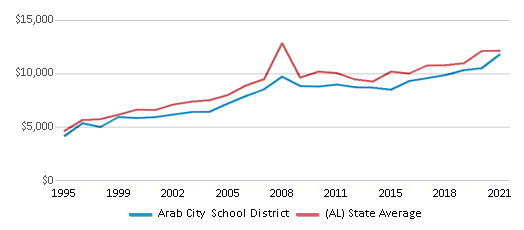
Spending / Student
$10,536
$12,220
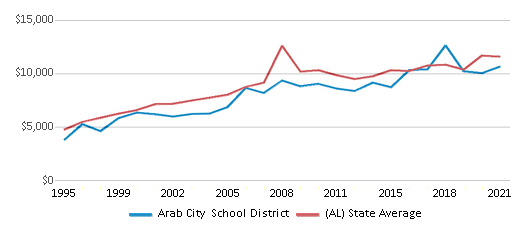
Best Arab City School District Public Preschools (2025)
School
(Math and Reading Proficiency)
(Math and Reading Proficiency)
Location
Grades
Students
Rank: n/an/a
121 Mimosa St Ne
Arab, AL 35016
(256) 586-6005
Arab, AL 35016
(256) 586-6005
Grades: PK-2
| 703 students
Recent Articles

Year-Round Or Traditional Schedule?
Which is more appropriate for your child? A year-round attendance schedule or traditional schedule? We look at the pros and cons.

Why You Should Encourage Your Child to Join a Sports Team
Participating in team sports has a great many benefits for children, there is no doubt. In this article you will learn what those benefits are.

White Students are Now the Minority in U.S. Public Schools
Increasing birth rates among immigrant families from Asia and Central and South America, combined with lower birth rates among white families, means that for the first time in history, public school students in the United States are majority-minority. This shift in demographics poses difficulties for schools as they work to accommodate children of varying language abilities and socio-economic backgrounds.





